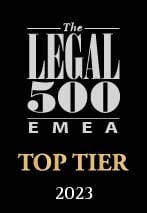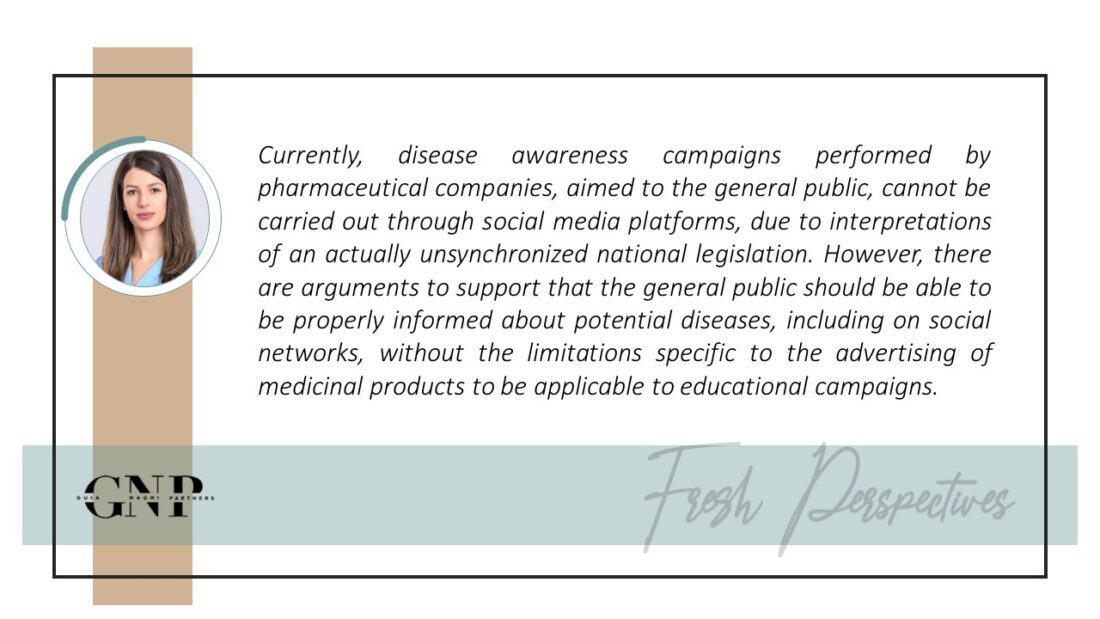Alina Stoica – Disease awareness campaigns developed by pharmaceutical companies – why should such campaigns be conducted on social media platforms
Disease awareness campaigns are not advertisement to medicines
Advertisement to medicines can be performed under strictly regulated conditions. Advertisement to RX (i.e., medicines released based on medical prescription) to the general public is prohibited, while advertisement to OTC (i.e., over-the-counter medicines) may be performed while observing multiple limitations. In any case, advertisement materials identify the medicinal product and/or its producer.
Disease awareness campaigns are different in their goal and content from advertisements to medicines. In the view of Order 194/2015, disease awareness campaigns are educational materials targeted at general public and/or healthcare professionals, aimed at informing the general public about a disease or a medicine, which do not encourage the prescription, distribution, sale, administration, recommendation and usage of medicines.
The reasons for which disease awareness campaigns may not be performed through social media
Both advertisement to medicines and disease awareness campaigns must be approved by the National Agency for Medicines and Medical Devices of Romania („NAMMDR”) prior to implementation, based on the provisions of Order 194/2015.
Although there are references to disease awareness campaigns within the provisions regulating advertisement of medicines, the similarities between the two concepts is far from being clear, especially when it comes to dissemination channels (in general) and display on social media (in particular). This ambiguity serves as the basis for a restrictive interpretation on behalf of NAMMDR, which interprets the following provisions of Order 194/2015 in the sense that awareness/educational campaigns aimed at the general public may NOT be carried out through social media platforms (e.g., Facebook or Instagram):
| Advertisement to the general public through social networks or mobile applications is prohibited. |
The provisions of the Order 194/2015, as interpreted by NAMMDR, are not aligned with the primary national legislation and with EU regulations
The (complete) legal framework regulating advertisement of medicines is made of Directive 2001/83/EC of the European Parliament and the Council of 6 November 2001 on the Community code relating to medicinal products for human use („Directive 2001/83/EC”), Law no. 95/2006 on the healthcare reform („Law 95/2006”) and Order 194/2015.
Directive 2001/83/EC does not lay down any prohibition regarding advertisement of medicinal products on social media and, as per the case-law of the European Court of Justice (C-374/05), member states should not adopt additional restrictions or prohibitions to the one provided by the Directive. Similar provisions are laid down by Law 95/2006.
All in all, in order to align the provisions of the Order 194/2005 with the provisions of Law 95/2006 and Directive 2001/83/EC, the prohibition on conducting advertisement through social media should be waived. Furthermore, even if such prohibition is maintained for advertisement of medicines, this does not mean that the prohibition should also be maintained for disease awareness campaigns, considering that advertisement for medicines and disease awareness campaigns should each be governed by specific, separate regulations. In this regard, Directive 2001/83/EC and Law 95/2006 does not establish any limitations in what regards disease awareness campaigns.
Besides, the use of social media networks for awareness campaigns is already allowed in most EU Member States (e.g., Austria, Belgium, Denmark, Finland, France, Germany, Greece, Ireland, Italy, Poland, Sweden), which only confirms the above-mentioned point of view.
The authorities encourage the use of social media in this area
The European Commission[1] supports the use of the internet to facilitate patients’ right to be informed about their health status, medical conditions and the availability of treatments, stating that the internet plays a central role. The European Commission also recognizes the importance of social media in this regard.
[1] https://eur-lex.europa.eu/LexUriServ/LexUriServ.do?uri=COM:2007:0862:FIN:en:PDF
In addition, by way of the recent Preliminary report on OTC and food supplements[2], the Romanian Competition Council recommends the review and update of the advertisement regulatory framework for medicines, in order to permit advertisement through social media networks and mobile applications (even if some limitations remain applicable, so as public health is unaffected). This would all the more be logical for disease awareness campaigns.
[2] http://www.consiliulconcurentei.ro/wp-content/uploads/2022/01/Raport-preliminar-OTC-si-suplim-alim.pdf
That being said, the legislation and its interpretation should be directed in favour of patients, so that they are correctly and fully informed about various diseases, about potential risks and means of prevention. Disease awareness campaigns could (and should) become a popular post (or even hashtag) on Facebook or on any other platform, as long as the protection of the public health is the main interest pursued.





No Comments